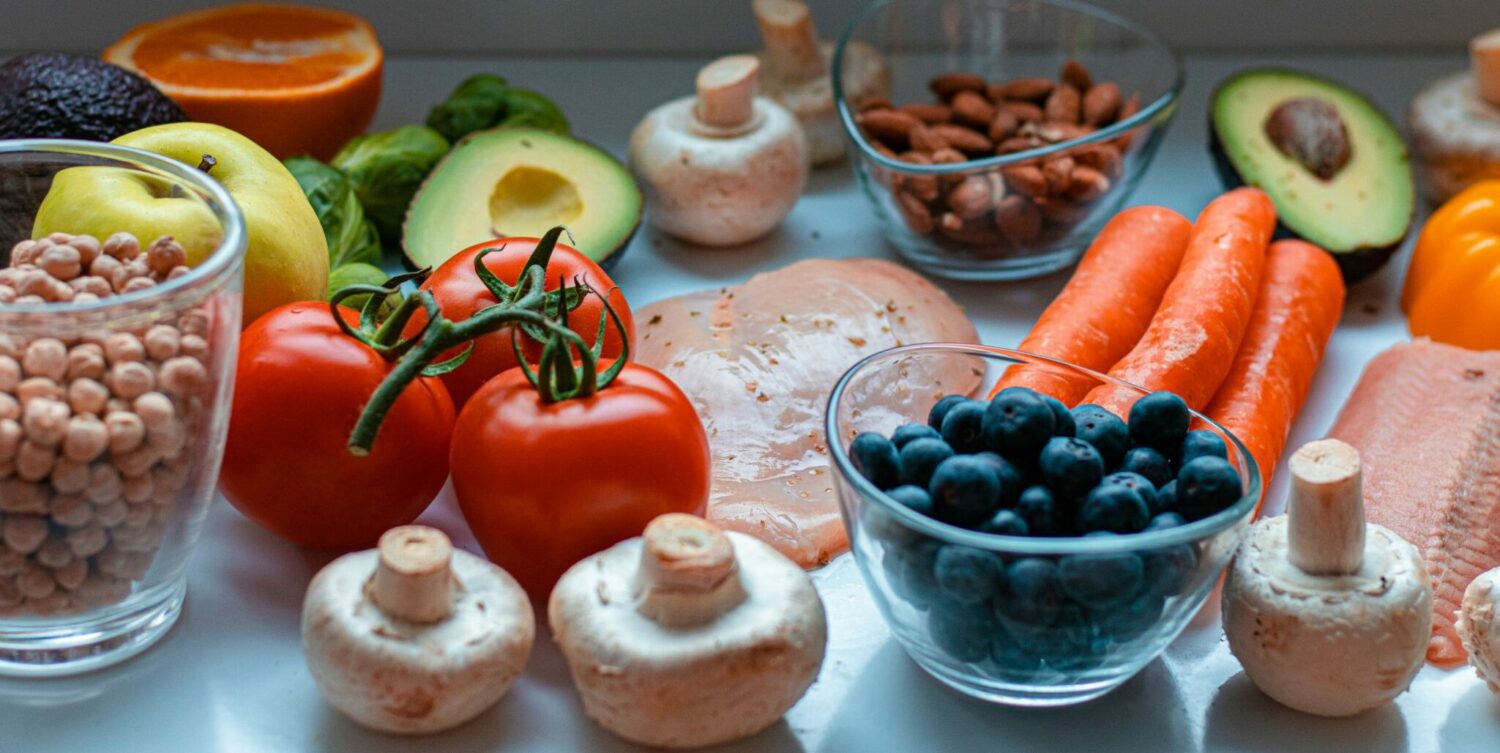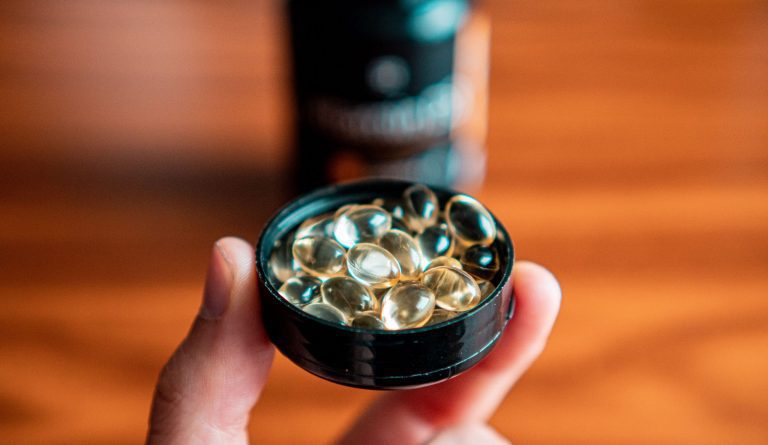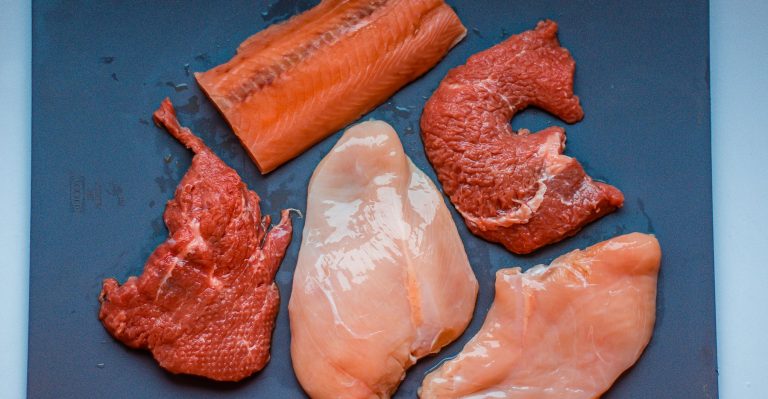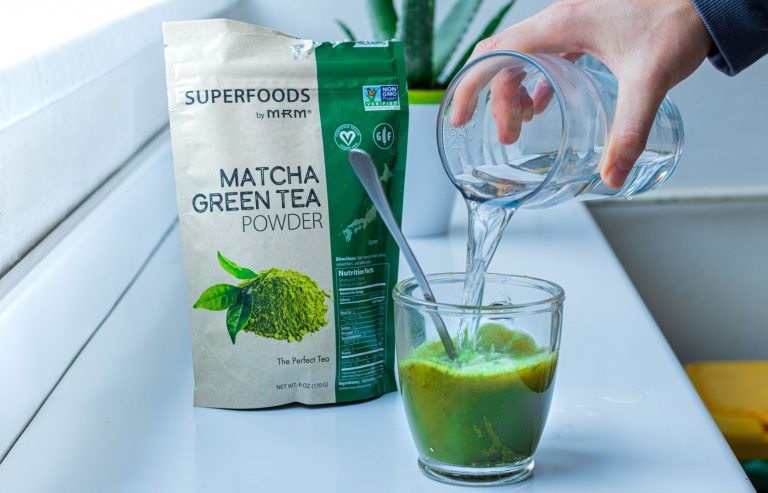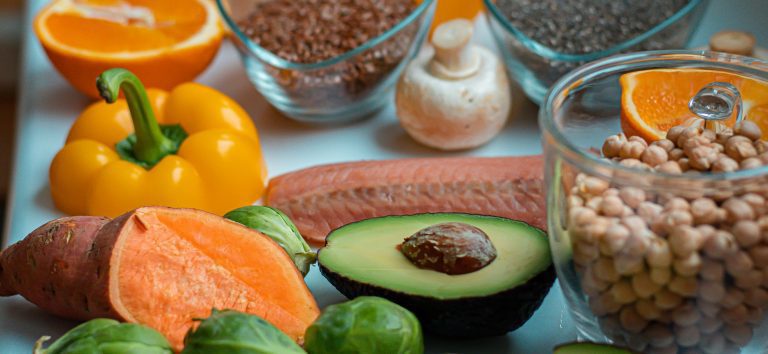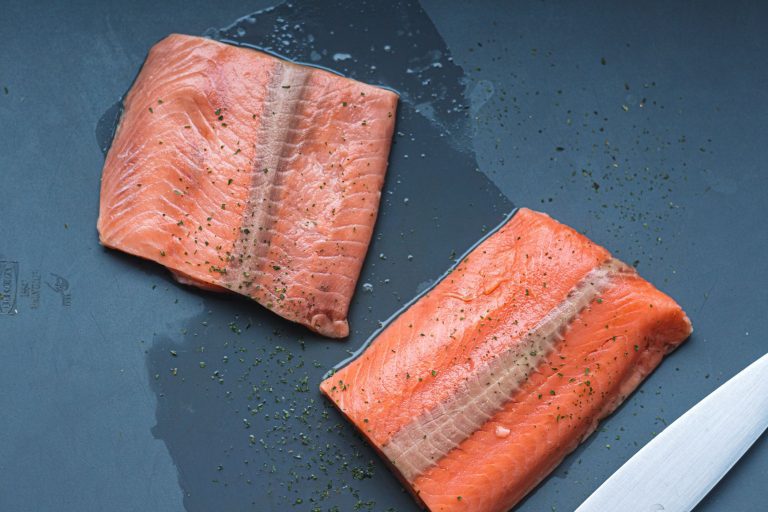Mediterranean Diet – The Healthiest Diet? Food list, Pyramid & Health Benefits
Mediterranean diet basics
The Mediterranean diet has made it on the top of the list, as one of the healthiest and most sustainable, easy-to-follow diets out of all.
Famous as a whole culture of foods and dieting, the Mediterranean diet comes from the style of eating that countries around the Mediterranean Sea invented, and still follow.
Full of nutrients, and very versatile, this diet even allows a little bit of wine and red meat here and there. Just make sure you are ready for this because the word the Mediterranean will be repeated hundreds of times throughout. Enjoy!
What is the Mediterranean diet?
Mediterranean diet is a pattern of eating that excludes many processed types of meat and sugars while encouraging eating plants, healthy oils, dairy, and fish.
If you’ve ever been to Spain, Greek, Italy, France, Turkey, or Croatia, you have probably stumbled upon the Mediterranean dishes.
Mediterranean diet relies on plant-based foods as the base of the diet, while including a moderate amount of white meat, fish, and dairy. Mainly, the diet itself is similar to flexitarian, which is a flexible vegetarian who is allowed to eat some meat here and there.
Some similar non-restrictive diets that are also quite sustainable, flexible, and healthy for the general population include The Paleo Diet and The Pescatarian Diet.
A Well-Balanced Diet
You might wonder why is Mediterranean diet performing so well, being at the top of most lists for improving overall health.
The answer is simple. Most of the other diets such as vegan, keto, carnivore, and fasting may be a little bit too restrictive for some people in the long run. Pretty hard to sustain, with few potential negative side effects in the case of a non-optimized diet and supplementation.
On the other hand, the Mediterranean diet is one of the best all-rounders out of all diets and is safe to be performed by the majority of the population without any side effects.
This is because the Mediterranean diet encourages a large variety of foods, basically including some whole grains, plants, meats, dairy, and even moderate amounts of wine.
When consuming so many different foods, especially following the Mediterranean style which relies on mostly non-processed foods, your health and longevity can be drastically improved.
Is the Mediterranean diet the healthiest diet in the world?
When it comes to health, every diet has its pros and cons. The important thing to note is, before switching to any diet it is best to consult with your doctor and nutritionist and follow what works for you.
That being said, we can dive into this question deeper.
- Since Mediterranean foods offer a good amount of fish, olive oil, nuts, seeds, vegetables, and fruits they are pretty stable and suitable for most people without any major risks.
- The foods present in this diet have high amounts of vitamins, minerals, essential nutrients, and amino acids, plus are loaded with healthy fats, antioxidants, and anti-inflammatory compounds.
- If there is one diet I’d choose over any other, for the long term, Mediterranean would be my main one. This is because it is hard to run on some deficiencies or problems following this diet.
- When we are talking about health, every diet can be made healthier or unhealthier. So, in order for you to benefit from this diet, you should follow a healthy eating plan and get a large variety of foods.
- So, before you start dumping Italian cheese-powered pizza or Greek gyros, let me walk you through the traditional style of Mediterraneans, so that you can learn how to eat healthy and well balanced in Mediterranean style
What Makes Mediterranean Food stand out?
Why is the Mediterranean diet healthier than other diets? Mainly, dumping the saturated fat and excessive salt intake can definitely be beneficial for your heart.
Some of the major changes seen in the Mediterranean diet are:
- Olive oil instead of Butter
- Red Wine instead of Beer
- Oregano & Garlic instead of Salt
- Fish & Seafood instead of Red Meat
Aside from replacing saturated fat, many Mediterranean foods have a pretty good amount of essential nutrients, and spices that can boost our metabolism and improve circulation which offers an additional benefit for cardiovascular health.

Mediterranean Diet Food Pyramid
The healthiest diet on earth isn’t just healthy because of the foods. Mediterranean style of eating also encourages many other themes or lifestyles related to longevity and health such as:
- moderate physical activity
- slow & mindful eating
- eating with friends & family
- dancing & listening to music
Usually, the Mediterranean style of eating focuses more on the quality of food, its origin, cooking, and eating rather than overall macronutrient profiles, which means you shouldn’t worry about the ratio of carbohydrates to fat or proteins you eat in the Mediterranean pyramid. In fact, you will see that these four activities are at the base, which makes them super important factors for living a longer and healthier life.
Aside from that, two things that this diet doesn’t have is:
- total food restriction
- macronutrient profile restriction
So what does the Mediterranean Food Pyramid actually look like?
Basics
Moderation
Small Amounts
Avoid
Foods eaten daily:
- Whole grains: Oats, Barley, Quinoa, Buckwheat, Brown Rice, Pasta.
- Vegetables: Olives, Spinach, Peppers, Cucumbers, Kale, Potatoes, Carrots.
- Fruits: Bananas, Avocados, Tomatoes, Pineapples, Grapefruit, Mango, Blueberries.
- Beans & Legumes: Lentils, Kidney beans, Soybeans, Black & Lima beans, Fava beans.
- Nuts: Cashews, Almonds, Brazil nuts, Walnuts, Pistachios.
- Seeds: Chia, Flax, Pumpkin, Sunflower, Sesame, Hemp.
- Healthy Oils: Olive oils (low in saturated fats) optional: corn and peanut oil.
- Herbs & Spices: Oregano, Thyme, Rosemary, Saffron, Sage, Turmeric, Garlic, Cumin.
Foods eaten weekly:
- Seafood: Salmon, Shrimp, Lobster, Octopus, Scallop, Crabs, Fish, Oysters
- Poultry: Chicken, Eggs, Cheese
- Wine: Red, high-quality wine (up to 14 servings per week)
Foods eaten monthly:
- Meat: Red meats such as pork, beef, bison
- Sweets: dried fruit such as fig, raisin, dates
Foods to avoid on the Mediterranean Diet:
- Processed red meat: salami, sausage, bacon & ham
- Refined sugars: white bread & white pasta, crackers, cookies, pastries, cakes.
- Excessive alcohol should be avoided for health reasons.
- Oils high in saturated fat: butter, coconut oil, palm kernel oil
What does it look like, and why is it healthy?
Think of beans and legumes mixed in a sauce of rosemary, garlic, and cumin with olive oil or pineapple with dark chocolate for a dessert.
Mainly, this diet is cutting off saturated fat and processed foods and fuels up on healthy fats and plant-based foods with the addition of seafood and poultry. And oh, a little bit of wine.
Mediterranean diet puts emphasis on healthy oils, whole grains, and vegetables. If you think of what a Mediterranean dish looks like you would think of some fish with tomatoes, pepper, and cucumber with a tablespoon of olive oil and oregano that makes a Mediterranean dish.
This is one of the main reasons why it is healthy for the heart, I mean think of it. Cutting processed oils and red meat can have a great impact on cholesterol profile and may cut the risk of cardiovascular diseases.
Instead of salt, the Mediterranean diet focuses on spices and herbs which makes the food taste even more intense, wild, and tropical rather than just adding a bunch of salt which leads me to the next thing related to longevity, hypertension. Reducing excessive salt intake can lower your blood pressure scores which is an important factor when it comes to heart health and longevity.
What is the Mediterranean diet?
The Mediterranean diet is considered on of the healthiest diets in the world. It is a pretty flexible, non-restrictive diet patterns which excludes processed meat and sugars, and encourages eating plant-based foods, healthy oils, fish and dairy.
What makes the Mediterranean diet the healthiest diet in the world?
The people who live the longest in the blue-zones mainly eat foods characteristic for the Mediterranean diet. The Mediterranean diet has a great ratio of plants, healthy oils and fish. In fact, what makes the carnivore diet restrictive is not eating plant-based products. What makes the vegan diet restrictive is excluding animal products. The Mediterranean diet allows both, but excludes the foods that are considered unhealthy for the general population, like too much processed red meats, unhealthy oils and sugars. It is like unhealthy-food elimination diet.
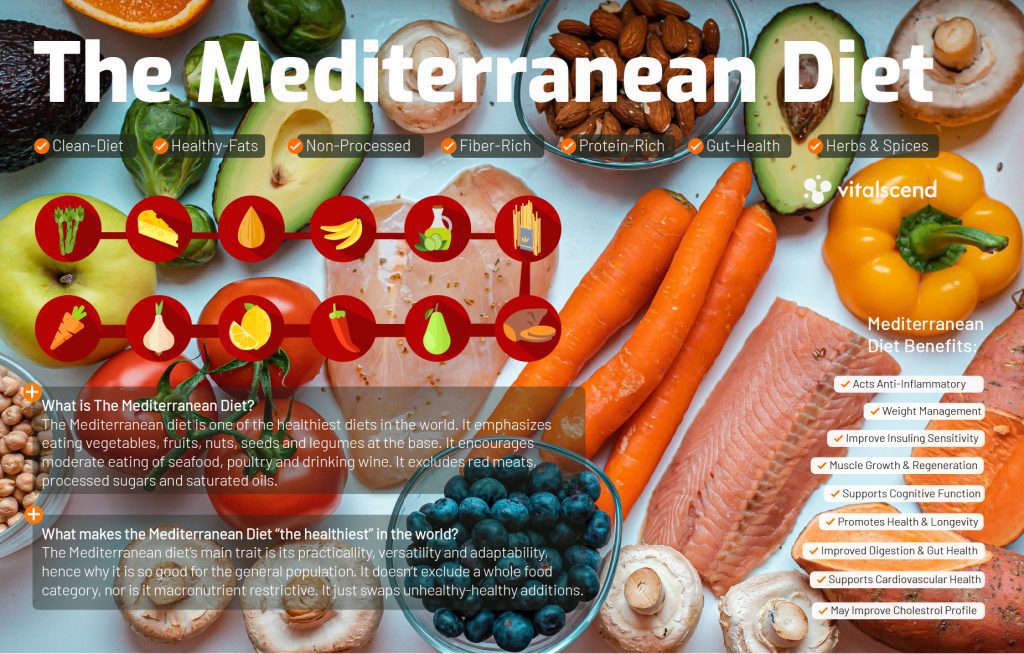
Mediterranean Cuisine
Mediterranean cuisine originates from the plethora of cooking styles, Mediterranean foods, and preparations in the Mediterranean region.
The Mediterranean Sea is right between Africa, Europe, and Asia. The most popular Mediterranean nutrition is linked to the regions of Italy, Greece, Spain & Turkey.
Characterized by three main elements of the cuisine such as olive, grape, and wheat, the Mediterranean style of eating has been significantly spread throughout the world.
Traditional Mediterranean Foods
What is the most characteristic thing about the Mediterranean style of eating? Oregano, Olive oil, Red wine, Tomato, Cheese, Fish, Garlic, Quinoa, Pepper, Pasta, and Garlic. This is how the diet looks in a nutshell.
Mediterranean diet has recently grown in popularity so much, because of its health benefits and a large variety of foods you can eat, without having to restrict yourself on a macronutrient level.
It is made possible in Mediterranean countries, because of the environmental conditions, the Mediterranean Sea, and the climate. In these regions, people usually eat raw and fresh products, straight from nature around them.
Mainly vegetables, legumes, a lot of spices and herbs, whole-wheat foods and fruits are part of it. Just to get an idea of what this diet looks like, I will show you some popular Mediterranean dishes.
Mediterranean dishes
Here are a few examples of Mediterranean dishes
| Greek salad | one of the most Mediterranean foods you can find. It is filled with veggies, such as tomatoes, olives, cucumber, onion, and peppers. Topped with oregano and olive oil, and extra cheese on top. One of my favorite, most refreshing salads. |
| Italian pasta | a great pasta alternative when you want to go Mediterranean style. It is delicious, free of saturated fat. Usually comes in combination with tomato sauce, garlic, anchovies, and basic, tastes delicious. |
| Shakshuka | one of the most famous breakfast recipes in Israel, also popular in North Africa and Morocco. It is made by stewing tomatoes in olive oil, with the addition of peppers. Poached eggs are added with hot tomato sauce, cumin, or jalapeno pepper served with whole-grain bread. It is a great metabolism-boosting, low-carb breakfast. |
| Grilled Swordfish | one of the top seafood meals popular in Greece. It is a fresh, protein-rich option with extra antioxidants. Can be eaten as a part of a salad or as the main meal. The swordfish is grilled, and served with the addition of marinade made from olive oil, lemon, garlic, thyme, basil, and oregano. |
| Bouillabaisse | a combination of vegetables, seafood, and spices. It is one of the most popular French dishes made with whiting, monkfish, sea robin, and lobster in a soup-like dish, rich in herbs and spices from Mediterranean cuisine, such as garlic, thyme, parsley, and onion. |
| Italian pizza | makes you love pizza even more. Not every pizza is unhealthy, we must all agree on that. Italian pizza is a healthier option, having tomato sauce, chopped onion, olive oil, and mozzarella as a topping. |
| Nicoise | one of the healthiest salads in the world, popular in France. It is a combination of great lean protein and veggies, a low-carb, mineral, and vitamin-enriched masterpiece. It combines asparagus, olives, eggs, tuna, avocado, olive oil, bell peppers, basil leaves, and scallions. |
| Hummus | a savory dish or a dip made from chickpeas, popular among vegans. Usually eaten with carrots, as a snack. The hummus has a butter-like texture, is made by combining chickpeas blended with tahini, garlic, lemon, and olive oil. It originates from Egypt, characteristic of Eastern cuisine. |
| Tabouli | a fresh salad made with bulgur and parsley, a traditional Lebanese salad. It is a combination of mint, parsley, and chopped vegetables, a great vegan alternative too. Usually served cold, with extra lemon juice squeezed on top, you can combine this one with whole-wheat pancakes or pita bread. |
| Falafel | the vegetarian alternative to meatballs. Originating from Egypt, falafel is a deep-fried patty made from ground fava beans and chickpeas, served with other veggies in a pita, and topped with tahini sauces. It looks like brown balls with a green interior in which parsley and cilantro dominate the taste. |
Health Benefits of the Mediterranean style of eating
The Mediterranean style of eating is pretty easy to follow, as it is not macronutrient-restrictive. You basically increase the consumption of plants like veggies and fruits, add some nuts, fish, and maybe a punch of red wine.
Just the fact you avoid processed red meat, oily fried foods, and excessive sugar intake puts you at an advantage. Potential health benefits are mainly the result of reducing these three and include:
| Supports Cardiovascular Health | May Protect the Heart and Lower Cholesterol |
| High Antioxidant Status | May Lower Inflammation (Inflammatory Markers) |
| Supports Brain Health | May Improve Cognition and Act Neuroprotective |
| Mood and Mental Health | May Boost Dopamine & Serotonin |
| Gut Health | High Fiber Feeds the Good Gut Bacteria, May Improve Digestion |
| Weight Loss | Weight Loss and Weight Management |
| Diabetes Management | May Improve Insulin Sensitivity & Blood Sugar Control |
| May Promote Longevity | All factors combined |
It’s important to note that part of the Mediterranean lifestyle is being active, cooking and preparing food yourself as well as eating in a family/friends setting. It’s also the trait of many of the longest-living humans who live in the 7 Blue Zones.
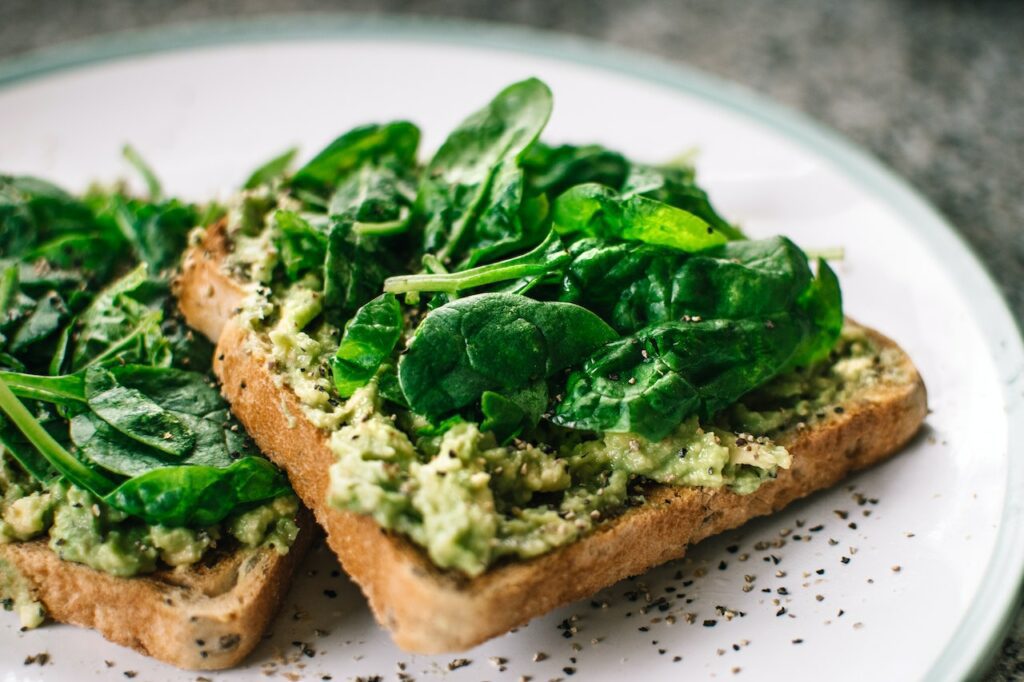
Best Foods to Eat on a Mediterranean Diet
Sometimes it is hard to choose healthier food alternatives when choosing a specific diet, but when it comes to the Mediterranean, this is not so hard. In its pyramid, MD offers whole grains, veggies, and fruits, beans & legumes as the main elements, on which you add some fish, poultry & olive oil, season it with natural herbs and spices and enjoy a glass of red wine, while avoiding sweets and red processed meats.
However, I picked the healthiest foods, suitable for the Mediterranean diet, so here is the list:
- Tomatoes, Peppers, and Oranges are among the highest vitamin C-containing foods present in the Mediterranean diet. Vitamin C is one of the main antioxidants in the body, improving collagen production, immune system function, iron absorption, and overall growth, development, and regeneration. Tomatoes are high in Lycopene, beta carotene, and chlorogenic acid, which can improve blood pressure, skin health, and inflammation.
- Olive oil & Avocado are some of the best monounsaturated fat sources, rich in oleic acid, known as an omega-9 fatty acid. Both contain good amounts of vitamin E, these two foods including Avocado oil are great for your skin health, have fat-soluble vitamin absorption, and anti-inflammatory response.
- Basil, Oregano, Parsley, and Turmeric are some of the most popular herbs and spices used in MD, loaded with tones of antioxidants. They are also nutrient-dense, especially oregano which contains calcium, fiber, vitamins A and C, and omega 3-fatty acids.
- Sweet Potato, Carrots, and Papaya are great sources of Beta-Carotene, a red/orange pigment that gives it its rich orange color. Beta-carotene is the precursor of vitamin A, which plays important role in healthy skin, and supports immune function and vision. Papaya is one of the highest bioavailable sources of beta-carotene (39) and eating sweet potato can improve vitamin A status. (40)
- Beans & Legumes are some of the best vegan options when it comes to lean protein. The highest protein options are soybeans, chickpeas, lentils, white & navy beans, black and red kidney beans offering around 15-30 grams of protein per cup.
- Spinach, Kale, and Swiss chard are some of the healthiest greens on the planet. They are loaded with tons of antioxidants, minerals, vitamins, and fiber. Kale contains vitamins B, A, K, and C, Spinach is rich in vitamin A and K as well, while also being high in lutein and beta-carotene and Swiss chard contains A, C, K as well, and is a good source of minerals such as potassium, manganese, and magnesium.
- Squash and Pumpkin seeds provide around 2,388 mg of Leucine in 100 grams, which equals 87% RDI. Since vegans run lower on leucine, this is a great alternative to boost your intake of this important amino-acid, especially for those looking to build muscle. (41)
- Oats, Quinoa and Brown Rice are great for weight loss and sugar stabilization. Quinoa is one of the best plant-based protein sources for vegans, which contains around 8 grams per cup, but a high-quality protein that includes all essential amino acids. (42) Oats are high in fiber, a special type known as beta-glucan that helps to manage blood sugar and lower cholesterol (43) while brown rice is a good B vitamin and minerals source.
- Chia & Flax seeds and Walnut oil are very rich in DHA and EPA (that many vegan diets lack) which are important omega-3 fatty acids crucial for healthy heart & brain function. Flax seeds are loaded with omega 3 and Thiamin (44), Chia seeds have an amazing omega3 to omega 6 ratio and are pretty nutritious (45) while Walnut oil provides 2,338mg of omega 3’s per only one tablespoon (10g). There are the best vegan omega3 alternatives.
- Bananas and Eggplant are all great sources of potassium. Potassium is an important mineral involved in fluid balance that can lower blood pressure. Per 100 grams, eggplants contain, 230mg, and bananas have 358mg (46) (47) (48)
There are other foods higher in potassium such as spinach, Swiss chard, and white potatoes, but in my opinion how much (quantity-wise) can you eat leafy greens, and is white potato really the healthiest option?
- Cocoa, Teas, Coffee, and Dark Chocolate are some of the highest antioxidant sources that have many inflammation-fighting and oxidative stress-reducing properties. Great options for improving mental performance & alertness. Caffeine is present in all of them, which can reduce fatigue, increase energy, and reduce the risk of cancer. (49)
- Berries: Blueberries, Raspberries, Blackberries are antioxidant powerhouses, each one of these berries helps reduce inflammation, improve skin health, and promote longevity. The addition of these three berries to a vegan or MD diet can improve your antioxidant status.
- Red Cabbage and Beetroot juice are some of the most powerful sources of vitamin C, which also contain some vitamin A and K, plus are rich in many important nutrients and minerals. Beetroot is great for lowering blood pressure due to its vasodilatory, Nitric Oxide increasing effect while red cabbage is a great immune supporter. (50)
- Mushrooms, Olives, and Palm Hearts all provide a great amount of Iron (around 20% RDI per cup), which is an essential mineral that plays role in oxygen transport and red blood cell creation that usually plant eaters lack. Other great Iron vegan-friendly alternatives include asparagus, leek, apricots, and acorn squash.
- Broccoli and Cauliflower are great for upregulating your vitamin intake. These cruciferous vegetables are pretty rich in vitamin C, vitamin K, and Folate which are important for immunity, skin aging, energy metabolism, oxygen transport, and bone strength. (51) (52)
- Hazelnuts, Almonds, and Brazil nuts are great fiber and protein-rich nuts that contain high levels of important minerals and antioxidants, such as vitamin E and Magnesium of around 8-37% and 20% of RDI, respectively. Vitamin E is known as a great antioxidant for the skin, which also exerts photoprotective effects and reduces oxidative stress. (53)
Conclusion
- Mediterranean diet is characteristic of the countries around the Mediterranean Sea region like Italy, Greece, Spain, and Turkey. Parts of the Blue Zones like Ikaria and Sardinia are Mediterranean-friendly, so this diet can make it on a healthy, sustainable, longevity-promoting diet list.
- Overall, MD includes a bunch of plant-based foods with whole grains, legumes, and beans on which we add a good punch of olive oil, leafy greens, and herbs or spices. When it comes to meat and alcohol, fish and seafood are great options with high-quality red wine occasionally, while avoiding trans fats, processed meat, and sweets.
- The benefits of this diet are seen in cardiovascular health, obesity and weight management, increasing lifespan and health span, and improving overall well-being and life quality.
Frequently Asked Questions
Is the Mediterranean diet anti-inflammatory?
Yes, it is. The Mediterranean diet incorporates some small changes that may have great impact on reducing inflammation. It swaps butter and coconut oil with healthy monounsaturated oils like olive oil. It swaps processed red meats with omega 3 rich seafood options like crab, fish, lobster, octopus, etc. It reduces the intake of refined, processed sugar too.
What foods to eat on the Mediterranean diet?
The main foods characteristic for the Mediterranean diet are: olive, tomatoes, olive oil, oregano, feta cheese, fish, wine, dark chocolate.
In general, the Mediterranean pyramid allows eating:
Basic foods daily: whole grains, fruits, vegetables, nuts, beans, seeds, herbs, spices, legumes, and healthy oils.
Foods eaten in moderation: seafood, poultry and wine
Foods eaten in small amounts: chicken, beef, dried fruits
How can the Mediterranean diet affect weight loss and diabetes?
The Mediterranean diet is one of the most sustainable long-term diets for healthy weight management. Just the facts that we exclude white, processed and refined sugar means a lot for weight-loss and diabetes. On top of that, red meats and processed meats are reduced or completely excluded, which reduced unhealthy fat intake. The high-fiber content of this diet may also improve gut health and stabilize blood sugar levels. It has a ton of satiety promoting foods which provide more calories per smaller volume. It also has a ton of metabolism boosting spices and herbs such as garlic, pepper, curcumin and turmeric, which can increase thermogenic effect of food and energy expenditure, thereby increasing the amount of calories we burn.
Which foods to avoid on a Mediterranean diet?
The foods to avoid on a Mediterranean diet are: processed red meats (salami, bacon sausage), refined sugars (crackers, white pasta, pastry, cookies), excessive alcohol and saturated fatty oils (kernel oil, coconut oil, butter).

